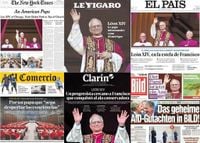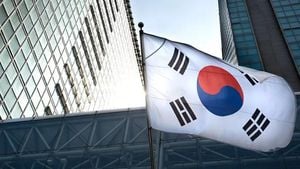The election of Robert Francis Prevost as Pope Leo XIV has captivated the world, marking a historic moment as he becomes the first American Pope in history. Elected on May 8, 2025, after a remarkably swift conclave that lasted only 21 hours and concluded with the fourth ballot, the new pontiff carries a message of peace and humanity that resonates deeply in today’s tumultuous times.
Prevost, a 69-year-old Augustinian from Chicago, has a rich history as a missionary in Peru, where he also holds citizenship. His election is seen as a continuation of the pastoral approach of his predecessor, Pope Francis, yet with a more moderate tone on certain contentious issues. In his first speech, he emphasized the importance of building bridges and advocating for a "disarmed and disarming peace," a phrase that has quickly become emblematic of his vision for the papacy.
The reaction to Prevost's election has been overwhelmingly positive, with major newspapers across Europe, the United States, and South America highlighting the significance of his appointment. The New York Times, along with other international outlets, noted that Prevost's election reflects a commitment to the Church's social doctrine while also addressing contemporary challenges.
In his inaugural address, Prevost stated, "Peace be with you all," and called upon the faithful to "help us build bridges" for a peace that is humble and perseverant, rooted in divine love. His choice of the name Leo XIV is particularly meaningful, as it pays homage to Pope Leo XIII, who was instrumental in developing modern Catholic social teaching, and to Pope Leo the Great, who famously confronted Attila the Hun with the power of words alone.
Prevost's election is not just a personal triumph but also a signal of potential shifts within the Vatican. His appointment has been described as a mediation between the progressive wing of the Church, represented by Pope Francis, and more conservative factions. The Italian newspaper La Repubblica remarked on the spiritual and social message of Leo XIV, emphasizing his call for dialogue and compassion.
However, the new Pope faces significant challenges, including a financial deficit of over 70 million euros inherited from the Church's post-COVID struggles. The economic implications of his leadership will likely necessitate a thorough review of Vatican spending and management practices, as noted by Il Sole 24 Ore, which highlighted the urgent need for reforms.
Prevost's personal background as an Augustinian friar adds another layer to his papacy. Described as moved and moderate, he has been characterized as the "least American among Americans" due to his humble demeanor and commitment to service. His ability to connect with marginalized communities, particularly migrants, aligns with the Church's ongoing mission to advocate for those on the peripheries of society.
Moreover, his cautious stance on LGBTQ+ issues and the role of women within the Church indicates a potential balancing act as he navigates the complex landscape of modern Catholicism. While he maintains a close alignment with Pope Francis on issues of synodality and migration, he is expected to approach these topics with a more measured perspective.
The symbolism of his choice to wear the red mozzetta, a traditional garment that had been set aside by Pope Francis, is seen as a nod to the Church's heritage and a signal of continuity with certain aspects of Vatican tradition. This decision has sparked discussions about the balance between tradition and the need for reform in the Church.
As the world watches, Prevost's papacy unfolds amidst a backdrop of global challenges, including political upheaval, social inequality, and environmental crises. His commitment to peace and dialogue may serve as a guiding principle as he leads the Catholic Church into a new era, one that seeks to address both spiritual and temporal concerns.
In the wake of his election, the media spotlight has also turned to Francesco Renda, a chief corporal from Lamezia Terme, who is embroiled in an alleged blackmail case involving the heir to the Del Vecchio family. This story, while separate from the papal election, highlights the complexities of contemporary Italian society and the Church's role within it.
As Pope Leo XIV begins his papacy, the faithful and observers alike are eager to see how his leadership will shape the future of the Catholic Church. With a clear message of peace, a commitment to building bridges, and a nuanced understanding of modern challenges, Prevost is poised to make a significant impact in a world that yearns for hope and reconciliation.




